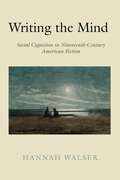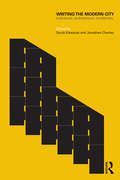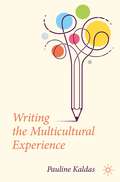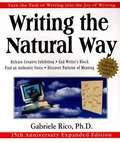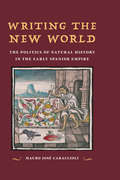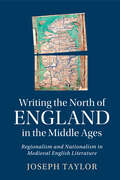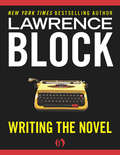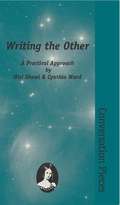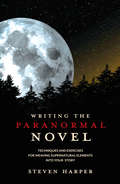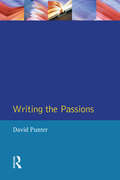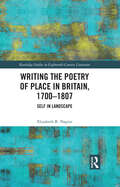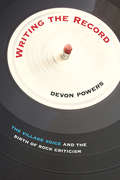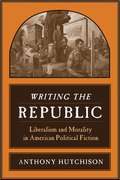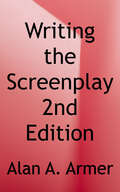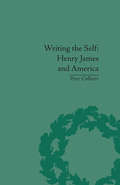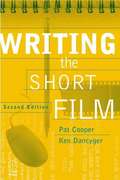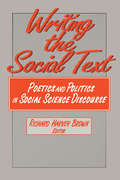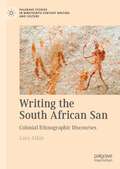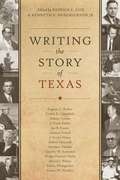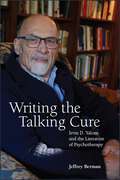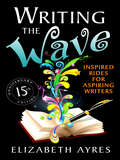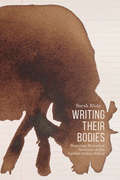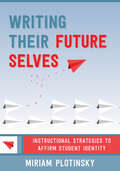- Table View
- List View
Writing the Mind: Social Cognition in Nineteenth-Century American Fiction
by Hannah WalserNovels are often said to help us understand how others think—especially when those others are profoundly different from us. When interpreting a character's behavior, readers are believed to make use of "Theory of Mind," the general human capacity to attribute mental states to other people. In many well-known nineteenth-century American novels, however, characters behave in ways that are opaque to readers, other characters, and even themselves, undermining efforts to explain their actions in terms of mental states like beliefs and intentions. Writing the Mind dives into these unintelligible moments to map the weaknesses of Theory of Mind and explore alternative frameworks for interpreting behavior. Through readings of authors such as Charles Brockden Brown, Herman Melville, Martin Delany, Harriet Beecher Stowe, Charles Chesnutt, and Mark Twain, Hannah Walser explains how experimental models of cognition lead to some of the strangest formal features of canonical American texts. These authors' attempts to found social life on something other than mental states not only invite us to revise our assumptions about the centrality of mind reading and empathy to the novel as a form; they can also help us understand more contemporary concepts in social cognition, including gaslighting and learned helplessness, with more conceptual rigor and historical depth.
Writing the Modern City: Literature, Architecture, Modernity
by Sarah Edwards Jonathan CharleyLiterary texts and buildings have always represented space, narrated cultural and political values, and functioned as sites of personal and collective identity. In the twentieth century, new forms of narrative have represented cultural modernity, political idealism and architectural innovation. Writing the Modern City explores the diverse and fascinating relationships between literature, architecture and modernity and considers how they have shaped the world today. This collection of thirteen original essays examines the ways in which literature and architecture have shaped a range of recognisably ‘modern’ identities. It focuses on the cultural connections between prose narratives – the novel, short stories, autobiography, crime and science fiction – and a range of urban environments, from the city apartment and river to the colonial house and the utopian city. It explores how the themes of memory, nation and identity have been represented in both literary and architectural works in the aftermath of early twentieth-century conflict; how the cultural movements of modernism and postmodernism have affected notions of canonicity and genre in the creation of books and buildings; and how and why literary and architectural narratives are influenced by each other’s formal properties and styles. The book breaks new ground in its exclusive focus on modern narrative and urban space. The essays examine texts and spaces that have both unsettled traditional definitions of literature and architecture and reflected and shaped modern identities: sexual, domestic, professional and national. It is essential reading for students and researchers of literature, cultural studies, cultural geography, art history and architectural history.
Writing the Monarch in Jacobean England
by Jane RickardKing James VI and I's extensive publications and the responses they met played a key role in the literary culture of Jacobean England. This book is the first sustained study of how James's subjects commented upon, appropriated and reworked these royal writings. Jane Rickard highlights the vitality of such responses across genres - including poetry, court masque, sermon, polemic and drama - and in the different media of performance, manuscript and print. The book focuses in particular on Jonson, Donne and Shakespeare, arguing that these major authors responded in illuminatingly contrasting ways to James's claims as an author-king, made especially creative uses of the opportunities that his publications afforded and helped to inspire some of what the King in turn wrote. Their literary responses reveal that royal writing enabled a significant reimagining of the relationship between ruler and ruled. This volume will interest researchers and advanced students of Renaissance literature and history.
Writing the Multicultural Experience
by Pauline KaldasThis textbook takes a new approach to teaching creative writing that centers the concerns of multicultural students. It focuses on the experiences of those who wish to write through their diverse identities, including ethnic, cultural, racial, national, regional, and international identity as well as gender identity, sexual preference, class position, and disability. Combining the study of culturally diverse literature with the process of writing, students are encouraged to engage with various texts and to use them to inspire their own work. Organized around a series of writing prompts and discussions of literary readings that address identity, place, perception, family, community, encounters, inheritance, and resistance, this book offers both writers and teachers a way to engage with the practice of writing from a multicultural perspective.
Writing the Natural Way: Using Right-Brain Techniques to Release Your Expressive Powers
by Gabriele RicoCompletely revised, newly illustrated, and with a wealth of updated, field-tested exercises, this popular classic will help unlock natural writing styles and storytelling abilities.
Writing the New World: The Politics of Natural History in the Early Spanish Empire
by Mauro José CaraccioliIn Writing the New World, Mauro Caraccioli examines the natural history writings of early Spanish missionaries, using these texts to argue that colonial Latin America was fundamental in the development of modern political thought. Revealing their narrative context, religious ideals, and political implications, Caraccioli shows how these sixteenth-century works promoted a distinct genre of philosophical wonder in service of an emerging colonial social order.Caraccioli discusses narrative techniques employed by well-known figures such as Gonzalo Fernández de Oviedo and Bartolomé de Las Casas as well as less-studied authors including Bernardino de Sahagún, Francisco Hernández, and José de Acosta. More than mere catalogues of the natural wonders of the New World, these writings advocate mining and molding untapped landscapes, detailing the possibilities for extracting not just resources from the land but also new moral values from indigenous communities. Analyzing the intersections between politics, science, and faith that surface in these accounts, Caraccioli shows how the portrayal of nature served the ends of imperial domination.Integrating the fields of political theory, environmental history, Latin American literature, and religious studies, this book showcases Spain’s role in the intellectual formation of modernity and Latin America’s place as the crucible for the Scientific Revolution. Its insights are also relevant to debates about the interplay between politics and environmental studies in the Global South today. This book is freely available in an open access edition thanks to TOME (Toward an Open Monograph Ecosystem)—a collaboration of the Association of American Universities, the Association of University Presses, and the Association of Research Libraries—and the generous support of Virginia Tech.
Writing the North of England in the Middle Ages: Regionalism and Nationalism in Medieval English Literature (Cambridge Studies in Medieval Literature #119)
by Joseph TaylorWriting the North of England in the Middle Ages offers a literary history of the North-South divide, examining the complexities of the relationship – imaginative, material, and political – between North and South in a wide range of texts. Through sustained analysis of the North-South divide as it emerges in the literature of medieval England, this study illustrates the convoluted dynamic of desire and derision of the North by the rest of country. Joseph Taylor dissects England's problematic sense of nationhood as one which must be negotiated and renegotiated from within, rather than beyond, national borders. Providing fresh readings of texts such as Chaucer's Canterbury Tales, the fifteenth-century Robin Hood ballads and the Towneley plays, this book argues for the North's vital contribution to processes of imagining nation in the Middle Ages and shows that that regionalism is both contained within and constitutive of its apparent opposite, nationalism.
Writing the Novel
by Lawrence BlockWriting lessons from the crown prince of suspenseFor more than five decades, Lawrence Block has written novels. He has produced hard-boiled detective stories, taut suspense thrillers, literature, and erotica, and has succeeded in all these genres because he knows how to grab a reader with an opening line, and how to tighten that grip until the final sentence.In Writing the Novel: From Plot to Print, Block offers neither tricks nor formulas, but straightforward advice based on the experience that comes with producing more than one hundred books. He explains how to refine an idea, how to study one's chosen genre, and how to use the novel's expansive form to find one's particular voice. And he tells it all in the easy, immediate style that has made his own work so successful.This ebook features an illustrated biography of Lawrence Block, including rare photos and never-before-seen documents from his personal collection, and a new afterword written by the author.
Writing the Other: A Practical Approach (Volume 8 in the Conversation Pieces Series)
by Nisi Shawl Cynthia WardMany writers avoid creating characters of different ethnic backgrounds than their own, out of fear that they might get it wrong. To address this fear, Nisi Shawl and Cynthia Ward collaborated to develop a workshop that addresses these problems with the aim of both increasing writers' skill and sensitivity in portraying difference in their fiction as well as allaying their anxieties about "getting it wrong." Writing the Other: A Practical Approach is the manual that grew out of their workshop. It discusses basic aspects of characterization and offers elementary techniques, practical exercises, and examples for helping writers create richer and more accurate characters with "differences."
Writing the Paranormal Novel: Techniques and Exercises for Weaving Supernatural Elements into Your Story
by Steven HarperVampires, werewolves, and zombies, oh my!Writing a paranormal novel takes more than casting an alluring vampire or arming your hero with a magic wand. It takes an original idea, believable characters, a compelling plot, and surprising twists, not to mention great writing. This helpful guide gives you everything you need to successfully introduce supernatural elements into any story without shattering the believability of your fictional world or falling victim to common cliches. You'll learn how to:Choose supernatural elements and decide what impact the supernatural will have on your fictional worldCreate engaging and relatable characters from supernatural protagonists and antagonists to supporting players (both human and non-human)Develop strong plots and complementary subplotsWrite believable fight scenes and flashbacksCreate realistic dialogueAnd much moreComplete with tips for researching your novel and strategies for getting published, Writing the Paranormal Novel gives you everything you need to craft a novel where even the most unusual twist is not only possible-it's believable.
Writing the Passions
by David PunterWriting the Passions is a book of literary criticism, of philosophy and of the politics of modernity. It explores the arguments on the location of feeling in literature; on the fragmentation of the self under the pressure of the passions; of the place of the passions in psychoanalytic practice and theory; and on the notions of multiplicity, soul, spirit, polytheism and animism developed from their bases in psychoanalytic and Derridean theory.The relations between writing and the passions are addressed through individual texts, ranging across many centuries and from Europe to China. Writers and texts discussed include Plato, Andrew Marvell, Swinburne, Salman Rushdie, Iain Banks, Deleuze, Guattari and many others. Topics addressed include: the meaning of crime passionnel; art and the wound; passion and ceremonial; adoration and abjection; dread and disgust; the nature of the exotic; shame and irony; separation, incompletion and the cure.Written in a uniquely engaging and accessible style, Writing the Passions provides readers with a fascinating exploration of the general notion of 'the passions', together with a set of historical insights into how the passions have been considered and treated in different literatures and cultures.
Writing the Poetry of Place in Britain, 1700–1807: Self in Landscape (Routledge Studies in Eighteenth-Century Literature)
by Elizabeth R. NapierThis book discusses the intrusion, often inadvertent, of personal voice into the poetry of landscape in Britain, 1700-1807. It argues that strong conventions, such as those that inhere in topographical verse of the period, invite original poets to overstep those bounds while also shielding them from the repercussions of self-expression. Working under cover of convention in this manner and because for each of these poets place is tied in significant ways to personal history, poets of place may launch unexpected explorations into memory, personhood, and the workings of consciousness. The book supplements traditionally political readings of landscape poetry, turning to questions of self-articulation and self-expression in order to argue that the autobiographical impulse is a distinctive and innovative feature of much great eighteenth-century poetry of place. Among the poets under examination are Pope, Thomson, Duck, Gray, Goldsmith, Crabbe, Cowper, Smith, and Wordsworth.
Writing the Record: The Village Voice and the Birth of Rock Criticism
by Devon PowersDuring the mid-1960s, a small group of young journalists made it their mission to write about popular music, especially rock, as something worthy of serious intellectual scrutiny. Their efforts not only transformed the perspective on the era's music but revolutionized how Americans have come to think, talk, and write about popular music ever since. In Writing the Record, Devon Powers explores this shift by focusing on The Village Voice, a key publication in the rise of rock criticism. Revisiting the work of early pop critics such as Richard Goldstein and Robert Christgau, Powers shows how they stood at the front lines of the mass culture debates, challenging old assumptions and hierarchies and offering pioneering political and social critiques of the music. Part of a college-educated generation of journalists, Voice critics explored connections between rock and contemporary intellectual trends such as postmodernism, identity politics, and critical theory. In so doing, they became important forerunners of the academic study of popular culture that would emerge during the 1970s. Drawing on archival materials, interviews, and insights from media and cultural studies, Powers not only narrates a story that has been long overlooked but also argues that pop music criticism has been an important channel for the expression of public intellectualism. This is a history that is particularly relevant today, given the challenges faced by criticism of all stripes in our current media environment. Powers makes the case for the value of well-informed cultural criticism in an age when it is often suggested that "everyone is a critic."
Writing the Republic: Liberalism and Morality in American Political Fiction
by Anthony HutchisonIn this provocative book, Anthony Hutchison challenges the belief that the American novel is "antipolitical" and condemns the relative absence of American literature in studies of the political novel. In Hutchison's view, our fiction is always informed by the complexities of the American political tradition, and to acknowledge this is to introduce a new, rewarding chapter of critical inquiry into the study of American literature.Focusing on the works of Herman Melville, Gore Vidal, Russell Banks, Lionel Trilling, and Philip Roth, Hutchison finds a critique of liberalism put forth by classical republicanism, transcendentalism, Marxism, and neoconservatism at their respective moments of historical ascent. He shows how these authors take very specific historical periods and episodes for their subject matter and interrogate, critique, and contextualize pivotal moments in the intellectual history of American liberalism. In their work, liberalism reconstitutes itself in the face of competing ideological pressures, demonstrating that the novel is very much characterized by a "republican" concern with the health of the polity.Considering such artists, philosophers, and theorists as Ralph Waldo Emerson, Fyodor Dostoevsky, Hannah Arendt, and John Dewey, alongside numerous contemporary commentators and historians, Hutchison repositions American novelists as serious political thinkers. He reveals Melville's Moby Dick to be the formal template for the American political novel and compares and contrasts its embodiment of "republican" fiction with the "democratic" mode Mikhail Bakhtin associates with Dostoevsky. He especially draws attention to the meaning of republicanism in the early national period, the place of abolitionism in the Civil War, and the post-1930s liberal retreat from Left radicalism. By concentrating on the tension between issues of liberalism and morality in the political thought of these American novelists, Hutchison hopes to advance a more nuanced and textured understanding of the U.S. political tradition. He scrutinizes a number of critical studies and makes a cogent case for a more interdisciplinary approach to the American political novel that focuses less on the politics of representation and more on the representation of politics.
Writing the Screenplay: TV and Film
by Alan A. ArmerIn this new edition, Emmy - Award winner Alan Armer takes aspiring writers through the essential steps needed to create successful dramatic scripts for TV and Film: visual thinking characters and plotting, story structure and conflict, dialog, and formats.
Writing the Self: Henry James and America
by Peter CollisterA monograph that re-evaluates the final decade of Henry James' creative life. It examines the narrative of "The American Scene", the autobiographical writing, a number of short stories and two incomplete novels: works which offer contrasting notations of the self.
Writing the Short Film (second edition)
by Ken Dancyger Pat CooperWriters who want to write a fil will find this to be a useful book. The usefulness of this book goes beyond the writing or filmmaking class.
Writing the Social Text: Poetics and Politics in Social Science Discourse
by Richard BrownDuring the past decade, it has become commonplace to interpret social and cultural reality-the very groundwork of the social sciences-as linguistic constructions. Not only is society viewed as a text, but scientific texts themselves are seen as rhetorical constructions. This collection of scholarly essays begins with an overview of this emerging field, and covers the specific stylistic practices by which social scientists create -objective- or -true- representations of society. The volume closes with a consideration of the more telling challenges to the rhetorics of the social sciences and how these might be encompassed or overcome.
Writing the South African San: Colonial Ethnographic Discourses (Palgrave Studies in Nineteenth-Century Writing and Culture)
by Lara AtkinThis book offers an innovative new framework for reading British and settler representations of Indigenous peoples in the nineteenth century. Taking the representation of the Southern African San as its case study, it uses methodologies drawn from critical anthropology, imperial history and literary studies to show the role that literary representations of Indigenous peoples played in popularising the hierarchical view of racial difference. The study identifies an ‘ethnographic poetics’ in which the claims of scientific discourse blend with a consciously literary preference for metaphor and analogy. This created a set of mobile figures that could be disseminated to different reading publics in both Britain and the colonies through a variety of literary genres and textual media. It advances research on race and imperial history by focusing on the importance of literature - from newspapers and periodicals to popular novels - in shaping discourses of national and racial belonging in Britain and the Cape Colony.
Writing the Story of Texas
by Patrick L. Cox Kenneth E. Hendrickson Jr.The history of the Lone Star state is a narrative dominated by larger-than-life personalities and often-contentious legends, presenting interesting challenges for historians. Perhaps for this reason, Texas has produced a cadre of revered historians who have had a significant impact on the preservation (some would argue creation) of our state's past. An anthology of biographical essays, Writing the Story of Texas pays tribute to the scholars who shaped our understanding of Texas's past and, ultimately, the Texan identity. Edited by esteemed historians Patrick Cox and Kenneth Hendrickson, this collection includes insightful, cross-generational examinations of pivotal individuals who interpreted our history. On these pages, the contributors chart the progression from Eugene C. Barker's groundbreaking research to his public confrontations with Texas political leaders and his fellow historians. They look at Walter Prescott Webb's fundamental, innovative vision as a promoter of the past and Ruthe Winegarten's efforts to shine the spotlight on minorities and women who made history across the state. Other essayists explore Llerena Friend delving into an ambitious study of Sam Houston, Charles Ramsdell courageously addressing delicate issues such as racism and launching his controversial examination of Reconstruction in Texas, Robert Cotner-an Ohio-born product of the Ivy League-bringing a fresh perspective to the field, and Robert Maxwell engaged in early work in environmental history.
Writing the Talking Cure: Irvin D. Yalom and the Literature of Psychotherapy
by Jeffrey BermanA distinguished psychiatrist and psychotherapist, Irvin D. Yalom is also the United States' most well-known author of psychotherapy tales. His first volume of essays, Love's Executioner, became an immediate best seller, and his first novel, When Nietzsche Wept, continues to enjoy critical and popular success. Yalom has created a subgenre of literature, the "therapy story," where the therapist learns as much as, if not more than, the patient; where therapy never proceeds as expected; and where the therapist's apparent failure provesultimately to be a success.Writing the Talking Cure is the first book to explore all of Yalom's major writings. Taking an interdisciplinary approach, Jeffrey Berman comments on Yalom's profound contributions to psychotherapy and literature and emphasizes the recurrent ideas that unify his writings: the importance of the therapeutic relationship, therapist transparency, here-and-now therapy, the prevalence of death anxiety, reciprocal healing, and the idea of the wounded healer. Throughout, Berman discusses what Yalom can teach therapists in particular and the common (and uncommon) reader in general.
Writing the Wave: Inspired Rides for Aspiring Writers
by Elizabeth AyresWhere's your wave of creativity? If you want to learn how to write, "Writing the Wave: Inspired Rides for Aspiring Writers" is the very first writing book designed especially for beginning writers who yearn to write more expressively. Written with warmth and wit by internationally acclaimed writer and teacher Elizabeth Ayres, this 15th anniversary edition of a classic writing how-to book makes the creative process safe, easy and fun while honoring its spiritual depth and mystery. Elizabeth shows you how it's done. With step-by-step instructions and easy-to-follow writing exercises, you'll be writing non-stop from the very first page, even if you've never written before. It's just like having a personal writing coach. You can learn how to be a writer. Throw away those endless lists of writing prompts. Learn how to discover your own ideas with these break-through writing exercises that transform fundamental writing principles into concrete writing techniques you can use over and over, forever, whether you want to learn how to write fiction, nonfiction, poetry -- or something that doesn't even have a name yet. Unlike other writing books, "Writing the Wave" couples inspiring writing exercises with expert and compassionate advice, to minimize the fears and maximize the joys of writing. And more advanced writers looking for a jumpstart will appreciate recovering their free-flowing creative wellspring. There's a vast ocean of inspiration within you. The surf's up! The water's warm! Are you ready to take the plunge? "Elizabeth Ayres has thought long and hard about the writing process, and is one of the most seasoned and exemplary practitioners in the field of teaching writing. This book about writing is an invaluable distillation of her insights and experiences. I cannot imagine any beginning or struggling writer not coming away with some inspiration from it." (Phillip Lopate, editor of "The Art of Writing" and "Writing New York")
Writing the West, 1750-1947: Representations from Indian Languages
by C. VijayasreeContributed papers presented at a national seminar organized by Sahitya Akademi held at Madurai, 2001.
Writing Their Bodies: Restoring Rhetorical Relations at the Carlisle Indian School
by Sarah KlotzBetween 1879 and 1918, the Carlisle Indian Industrial School housed over 10,000 students and served as a prototype for boarding schools on and off reservations across the continent. Writing Their Bodies analyzes pedagogical philosophies and curricular materials through the perspective of written and visual student texts created during the school’s first three-year term. Using archival and decolonizing methodologies, Sarah Klotz historicizes remedial literacy education and proposes new ways of reading Indigenous rhetorics to expand what we know about the Native American textual tradition. This approach tracks the relationship between curriculum and resistance and enumerates an anti-assimilationist methodology for teachers and scholars of writing in contemporary classrooms. From the Carlisle archive emerges the concept of a rhetoric of relations, a set of Native American communicative practices that circulates in processes of intercultural interpretation and world-making. Klotz explores how embodied and material practices allowed Indigenous rhetors to maintain their cultural identities in the off-reservation boarding school system and critiques the settler fantasy of benevolence that propels assimilationist models of English education. Writing Their Bodies moves beyond language and literacy education where educators standardize and limit their students’ means of communication and describes the extraordinary expressive repositories that Indigenous rhetors draw upon to survive, persist, and build futures in colonial institutions of education.
Writing Their Future Selves: Instructional Strategies to Affirm Student Identity
by Miriam PlotinskyWhatever subject you teach, you can encourage students’ sense of self-worth. “I’m a bad writer” is a disclaimer every secondary teacher has heard many times. Overcoming that negative self-image, Plotinsky argues, is key to helping students build a positive academic identity—and because of the vulnerability associated with sharing what we write, the benefits of interrupting this particular form of deficit thinking extend far beyond English class. Drawing on her years of experience as an English teacher and literacy specialist, Miriam Plotinsky uses writing instruction as a powerful vehicle to examine how teachers can help students build a sense of themselves as legitimate, valuable contributors to the world around them. The chapters move fluidly through ways to build capacity such as celebrating student voice, separating grading from class participation, giving feedback that inspires trust, and avoiding the labeling of students. Along the way, teachers in other content areas contribute insights into how the identity-building strategies in the book can be applied to their own disciplines.
